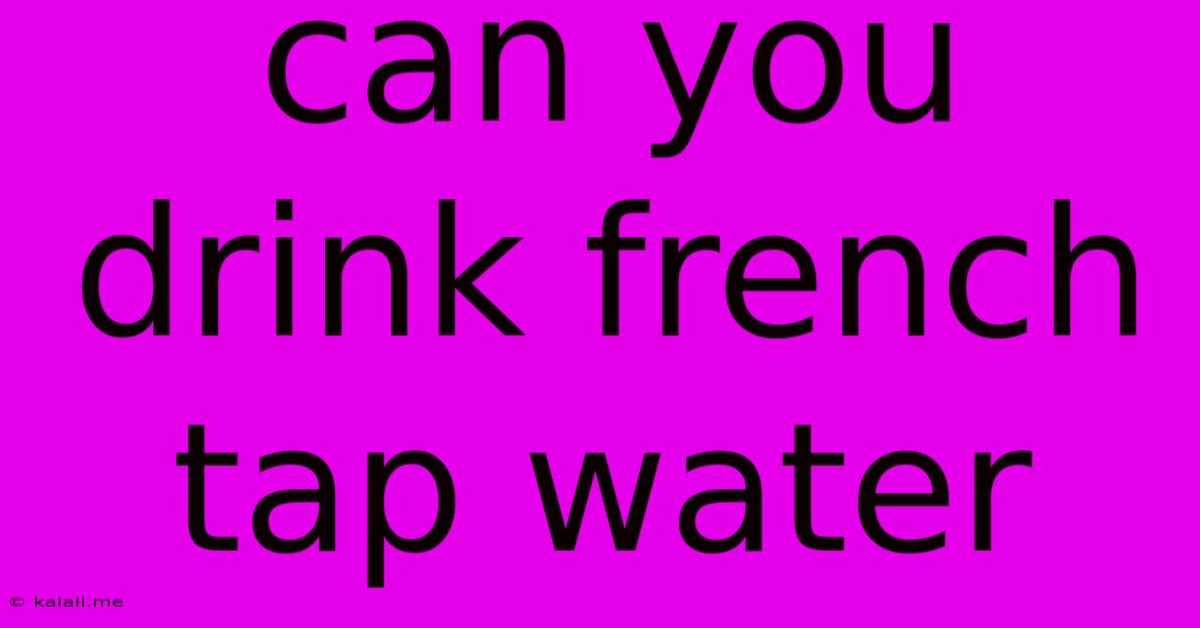Can You Drink French Tap Water
Kalali
May 19, 2025 · 3 min read

Table of Contents
Can You Drink French Tap Water? A Comprehensive Guide
Is French tap water safe to drink? This is a common question for travelers and expats alike. The short answer is: it depends. While generally safe in many areas, there are nuances you should be aware of before taking a refreshing swig straight from the tap. This guide will delve into the complexities of French tap water quality, helping you make informed decisions about your hydration.
The quality of French tap water varies significantly depending on the region. Major cities like Paris and Lyon generally have excellent water quality, rigorously monitored and treated to high standards. However, in more rural areas or smaller villages, the water quality can be less consistent. This isn't necessarily to say it's unsafe, but it might have a different taste or mineral content than you're accustomed to. Some areas may have higher levels of certain minerals, leading to a more pronounced taste, while others might have slightly higher chlorine levels used in treatment.
Understanding French Water Treatment
France has a robust public water system, with each region responsible for managing its own water infrastructure and treatment. Methods vary, but generally involve processes like filtration, chlorination, and sometimes ozonation to ensure the water is safe for consumption. Regular testing is conducted to monitor water quality and ensure compliance with strict regulations.
Potential Issues & What to Look Out For
While generally safe, several factors can influence the palatability and safety of French tap water:
- Mineral Content: French water often has a higher mineral content than in some other countries. This can lead to a distinct taste, sometimes described as "hard" water. This higher mineral content isn't necessarily harmful, but it might not suit everyone's palate.
- Chlorine Levels: Chlorination is a common disinfection method, and sometimes, higher chlorine levels might be noticeable in the taste. This is usually temporary and doesn't present a health risk.
- Regional Variations: As mentioned, water quality can fluctuate based on location. Rural areas might have less sophisticated treatment facilities than larger cities.
- Plumbing Issues: The condition of your accommodation's plumbing can also impact the taste and safety of the water. Older buildings may have lead pipes, although this is becoming less common.
When to Err on the Side of Caution
While most French tap water is safe, it's wise to exercise caution in certain situations:
- Rural Areas: If staying in a small village or rural area, consider using bottled water, especially if you have a sensitive stomach.
- Older Buildings: If staying in older accommodation, you might prefer bottled water until you’ve assessed the water quality.
- Unfamiliar Taste or Odor: If the water has an unusual taste, smell, or appearance, it's best to err on the side of caution and use bottled water.
- Health Concerns: If you have a compromised immune system, it's always advisable to use bottled water.
Conclusion: Making Informed Choices
The safety and taste of French tap water are highly location-dependent. While generally safe in most urban areas, understanding the potential variations and exercising caution in certain situations is crucial. If in doubt, opting for bottled water is always a safe alternative. Enjoy your trip, and stay hydrated!
Latest Posts
Latest Posts
-
Why Is Forking A Lawn Bad
May 20, 2025
-
The Lion The Witch And The Wardrobe Jadis
May 20, 2025
-
Signs My Dog Wants To Kill My Cat
May 20, 2025
-
Can Stainless Steel Go In The Oven
May 20, 2025
-
It Was Nice Speaking With You
May 20, 2025
Related Post
Thank you for visiting our website which covers about Can You Drink French Tap Water . We hope the information provided has been useful to you. Feel free to contact us if you have any questions or need further assistance. See you next time and don't miss to bookmark.